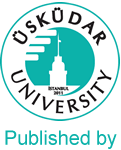Makale
Makale
Yeni Medya’ya Yönelik ‘Yeni’ Yaklaşımlar: Yeni Medya ve Post-Yapısalcılık/Postmodernizm
'New’ Approaches to New Media: New Media and Post-Structuralism/Postmodernism
Güven ÖZDOYRAN
Yıl 2, Sayı 4, Sayfalar:186-218
Although medium itself is described as “new”, the tendency to comprehend such a multi-dimensional phenomenon called new media with traditional paradigms is quite evident. However, traditional approaches do not allow us to accurately understand and conceptualize the new media environment itself, the objects in it and the subjects who interact with each other through this environment. As a result of that approach, for example, the decentralized structure of cyber-space, where, in Cartesian terminology, res extensa has completely disappeared and we exist merely as res cogitans, appears to us not as new opportunity but a threat. On the other hand, post-structuralism both appears as a result of the crises in the way traditional paradigms comprehend the world and the subject, and brings forward that the crisis is not stemmed from the world or human, but from the paradigm itself. Thus, this article will mainly argue that the reason for the melancholia or pessimism that dominates the tone of the debates about new media is rooted in perceiving the unique ontology of this medium as a threat. The main purpose of the article is to analyze the new media by implicating the arguments of the influential names of post-structuralism, such as Foucault, Derrida, Kristeva and Zizek, into the discussion, and hence to understand and criticize the crises produced both from new media itself and its interpretations. In this way, the claim that the new media is a technological manifestation of the post-structuralist paradigm will be discussed by directly reference to the main themes of post-structuralism, such as the rejection of the category of the subject, the plurality of the meaning, deconstruction and intertextuality.
Her ne kadar medium’un kendisi “yeni” olarak tanımlansa da, yeni medya gibi çok boyutlu bir fenomeni hâlâ geleneksel paradigmalar ile kavrama eğilimi oldukça belirgindir. Bu türden geleneksel yaklaşımların söz konusu ortamı, ortamda bulunan nesneleri ve bu ortam dolayımı ile ilişki kuran özneleri doğru bir biçimde kavramamıza ve kavramsallaştırmamıza izin vermediği söylenebilir. Geleneksel yaklaşımın sonucu olarak, Kartezyen terminoloji ile ifade edecek olursak, res extensa’nın tümüyle ortadan kalktığı ve yalnızca res cogitans olarak var olduğumuz bu ortamın, örneğin, merkezsiz yapısı bizlere yeni bir olanak olarak değil ama tehdit olarak görünür. Öte yandan, geleneksel paradigmaların hem dünyayı hem de özneyi kavrama tarzlarındaki krizlerin ortaya çıkardığı yeni bir perspektif olarak post-yapısalcılık, söz konusu krizin dünyadan ya da insandan değil; bizatihi paradigmanın kendisinden kaynaklandığını tartışmaya açar. Böylelikle bu makale, yeni medyayı tartışırken bu tartışmalara tesir eden melankolik ya da karamsar tonun sebebinin de bu ortamın kendine münhasır
ontolojisini bir tehdit olarak algılamaktan kaynaklandığını iddia edecektir. Makalenin temel amacı, yeni medyayı analiz ederken Foucault, Derrida, Kristeva ve Zizek gibi post-yapısalcılığın etkili isimlerinin argümanlarını tartışmaya dahil etmek ve böylelikle hem yeni medyanın kendisinden üretilen hem de bu ortamı anlama ve kavramsallaştırma ile ilgili ortaya çıkan “krizleri” anlamlandırmak ve eleştiriye tabi tutmaktır. Böylece özne kategorisinin reddi, yapı-söküm, bilgi/anlamın tekilliği/sabitliği yerine çoğullaşması, metinlerarasılık gibi post-yapısalcılığın merkezi temalarına referans vererek, yeni medyanın post-yapısalcı paradigmanın teknolojik bir tezahürü olduğu iddiası tartışmaya açılacaktır.

